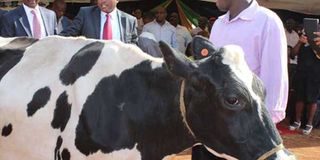Auditor-General report reveals how Murang’a lost Sh57m in questionable dairy plan

Murang’a Governor Mwangi Wa Iria and his deputy Gakure Monyo admire a cow during the launch of the one-youth-one-cow programme in 2015. An Auditor-General’s report has revealed that the county lost millions in the dairy-cow project. FILE PHOTO | MARTIN MWAURA | NATION MEDIA GROUP
What you need to know:
- Mariira Farm sold 81 cows, 20 died and 80 were left in the farm leaving three cows unaccounted for.
- The county spent Sh3.5 million on the building of five fodder silos at a cost of Sh693,000 each but they have not been utilised.
- Nine employees with multiple bank accounts received multiple salaries.
- The auditor also noted lack of control in issuance of receipt books which he said undermined accountably.
An Auditor-General’s report has revealed inflated purchases, questionable spending and huge disparities in financial statements in Murang'a County.
The county spent Sh57 million on a dairy-cow project that yielded only Sh4 million from the sale of animals, bull calves and milk.
According to Auditor-General Edward Ouko, the county had allocated Sh4 million to the Mariira Farm project, with each cow estimated to have cost the county over Sh250,000.
This resulted in a deficit of Sh52 million.
The county purchased 184 cows and sold 80 cows to farmers at subsidised prices as revealed in the report.
“The policy was to sell the animals at subsidised costs to willing farmers which appeared unsustainable in the long run.
“The farm sold 81 cows, 20 died and 80 were left in the farm leaving three cows unaccounted for,” explained the auditor.
UNUSED SILOS
The report further shows how the county spent Sh3.5 million to build five fodder silos for Sh693,000 each but they have not been utilised.
“No reason was given for not utilising the silos which may lead to wastage of public funds,” noted Mr Ouko after site visit.
The auditor further accused the county of operating 38 bank accounts and failing to submit some of their account balances at the close of the financial year in question.
Out of these accounts, 36 had not been integrated with Ifmis and therefore the county could not post into the system transactions related to these accounts.
This includes Sh897,000 transferred to the accounts from which payments were made through manual cheques.
“Only 19 bank account balances maintained by the county were disclosed in the financial statements. No explanation was provided for not disclosing the other 19 bank accounts,” noted the auditor.
ROADS POORLY DONE
The auditor also raised the red flag over Sh539 million spent on building roads whose drainage systems were poorly done while some roads were not constructed though they were paid for.
The auditor has also exposed how the county spent Sh10 million to print examinations for primary schools and another Sh3.9 million as motivation tokens for teachers.
“No policy on education was [provided] to support the payment considering that primary and secondary education is not a devolved function,” argued the auditor.
An analysis of the integrated payroll and personal database revealed that nine employees with multiple bank accounts received multiple salaries leading to an overpayment of Sh2.4 million in salaries.
IRREGULAR PROMOTIONS
The auditor also cited irregular promotions of three employees who were moved by more than one grade in one year contrary to the law.
"Promotions are systematic from one job group to another," argued the auditor.
The auditor also noted an under-collection of Sh237 million in revenue from local sources.
The county had set a target of Sh800 million but instead collected Sh562 million.
This was partly caused by an under-collection in parking fees at Sh17 million compared with the amount collected in the 2013/2014 financial year.
The auditor also noted lack of controls in the issuing of receipt books that he said undermined accountably and transparency in the collection of revenue.
Mr Ouko pointed out discrepancies in the budget balance between the results extracted from Ifmis and results from financial statements.
In the recurrent budget, Ifmis calculated a balance of Sh3.8 billion while the financial statements showed a balance of Sh2.6 billion resulting in a variance of Sh1.2 billion.





